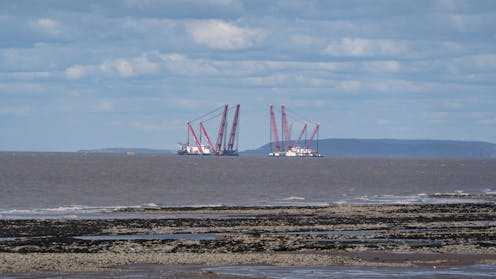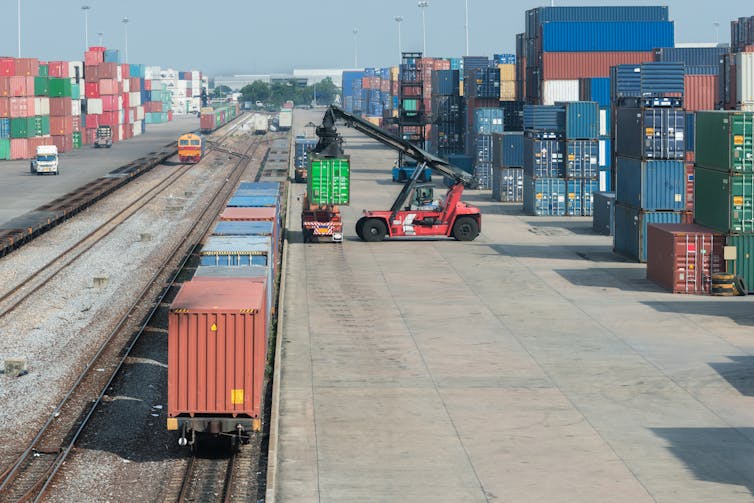Source: ForeignAffairs4
Source: The Conversation – UK – By Daniel Durrant, Lecturer in Infrastructure Planning, Bartlett School of Planning, UCL

Infrastructure planning needs more democracy, not less.
The UK has wasted billions of pounds of public and private money through failed infrastructure projects recently. Our research suggests there is a better way.
The planning and infrastructure bill now in parliament is an example of how the government’s approach fails. The bill has been criticised for pitting the environment against economic growth. Less well reported is that it removes a cornerstone of our democracy; the opportunity for citizens to participate in decision-making about the infrastructure that affects them. The bill removes the duty for the developers of big infrastructure projects to consult with local communities and local authorities before the formal planning process.
There has been a democratic deficit in infrastructure planning since the 2008 Planning Act established a separate planning process for infrastructure projects deemed nationally significant. These are larger with the need for them established in national policy statements produced by the relevant government department. For example, the Department for Transport produces policy statements that establish the need for new road and rail projects, as does the Department for Energy Security and Net Zero for wind or nuclear projects.
This process was meant to be both faster and fairer but the emphasis was always on speed. Despite the belief among policymakers that planning slows down the delivery of infrastructure the evidence suggests that factors outside of planning are the biggest source of delay.
The problems of delays and rising costs that beset projects like the nuclear power station Hinkley Point C, London’s super sewer the Thames tideway tunnel and the high-speed rail line HS2 have little to do with planning. These simply exemplify the problem of so-called “megaprojects” that take longer, cost more and deliver less than is promised.

PrasitRodphan/Shutterstock
The planning and infrastructure bill will not make the process fairer. Communities and groups affected will only get to make their case in writing and in public hearings where time to speak is limited, often to 15 minutes. The process makes it harder for communities to have their voices heard. It may not even be faster as speed in the planning stages comes at the expense of passing on problems to the more costly construction phase.
Deliberation means better decisions
Yet, when citizens are involved in public deliberative forums with experts and planners, they can make well-reasoned, long-term decisions. When communities and experts work together infrastructure can be co-designed. This is why we were part of a group of planning academics that recently called for amendments to the Bill to establish an expert body to support innovative democratic participation in infrastructure planning.
There are precedents. Canada’s 1977 Berger inquiry into proposals to construct a gas pipeline on land along the Mackenzie Valley subject to claims by Aboriginal organisations. The inquiry became a benchmark for the use of public deliberation in the environmental and social assessment of complex infrastructure. Justice Thomas Berger’s approach saw experts and citizens testify on equal terms. The inquiry went to the communities that were affected. It travelled over 17,000 miles across Canada’s northwest hearing testimony from Aboriginal and non-Aboriginal Canadians in eight different languages.
The use of public deliberation to inform decision-making has increased considerably since then. In 2020, a report from the Organisation for Economic Co-operation and Development, an international policy advice forum, showed that infrastructure, urban and strategic planning are consistently the top policy areas where deliberative forums are used.
Following conflicts over high-speed rail lines in the 1990s, France pioneered deliberative discussion for all large infrastructure projects. These are subjected to early, non-binding scrutiny, conducted by an independent agency with years of experience in organising democratic discussion. They found it was more efficient and quicker to bring people into discussions early on.
France also organised national debates on climate change. This public deliberation on energy or transport policy builds political consensus for years so policy does not change with each change of government. In the UK, this could provide a basis for the new generation of National Policy Statements on infrastructure.
The previous UK government’s own Innovation in Democracy programme – an initiative that tests the use of deliberative assemblies in local government – showed how they can be designed to fit the geographies of infrastructure. This is important because the consequences often go beyond local authority boundaries through which representative democracy is organised.
Despite huge challenges like the transition to renewable energy or mitigating climate change that new infrastructure has to deal with, trust in planning is often low, mirroring a general decline in faith in politics. Deliberative democracy can restore trust between citizens and politicians and address the problems of climate change.
Infrastructure decisions are technically complex. New, large-scale infrastructure is disruptive, expensive and rarely aligns with electoral time frames. Yet the costs and consequences of poor decisions are with us for a long time. Rather than a delay, planning in this way is time well spent.
Don’t have time to read about climate change as much as you’d like?
Get a weekly roundup in your inbox instead. Every Wednesday, The Conversation’s environment editor writes Imagine, a short email that goes a little deeper into just one climate issue. Join the 45,000+ readers who’ve subscribed so far.
![]()
I have received funding from the German Government’s Humboldt Foundation and the UK’s Engineering and Physical Sciences Research Council to study the controversies surrounding big infrastructure projects.
Tim Marshall received funding from ESRC, a Research Fellowship 2010-2102.
– ref. DON’T PUB YET: How deliberative democracy can help solve the UK’s infrastructure problems – https://theconversation.com/dont-pub-yet-how-deliberative-democracy-can-help-solve-the-uks-infrastructure-problems-261531
